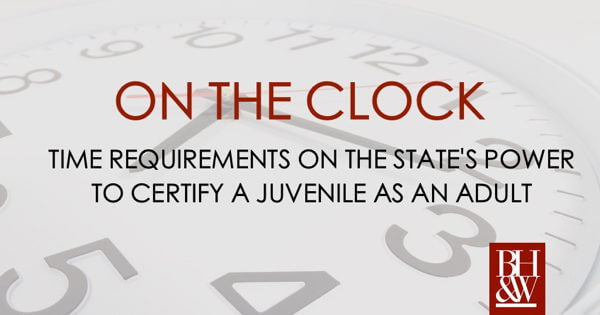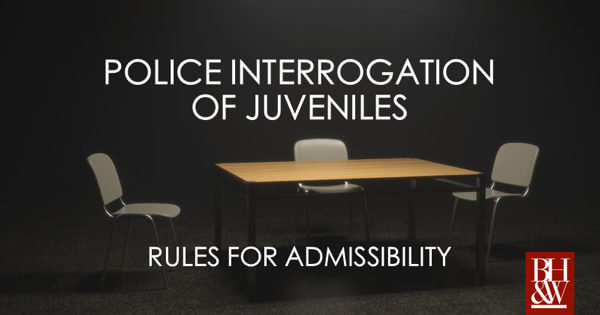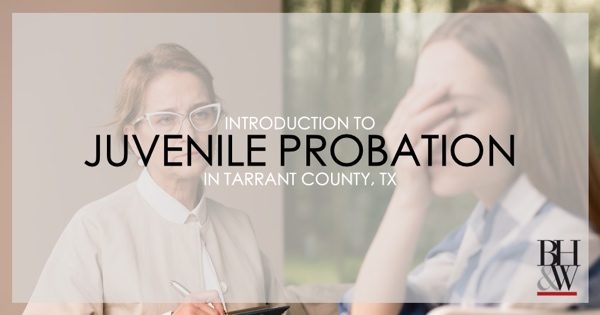 Are there any options for my child short of going to court? Many parents ask this question after finding out that their child has been referred to the juvenile system. For a lot of kids who are in trouble for the first time, there is a great option available: Deferred Prosecution Program (DPP). In Tarrant County, DPP is used quite often. This article will answer all of your questions about DPP.
Are there any options for my child short of going to court? Many parents ask this question after finding out that their child has been referred to the juvenile system. For a lot of kids who are in trouble for the first time, there is a great option available: Deferred Prosecution Program (DPP). In Tarrant County, DPP is used quite often. This article will answer all of your questions about DPP.
What is Tarrant County’s Juvenile DPP?
DPP is a form of informal probation. The juvenile is supervised by a probation officer and has conditions of supervision to abide by during the period of DPP. But unlike formal probation, DPP does not require court action.
How long does the Juvenile Deferred Prosecution Program last?
DPP can, initially, be up to 6 months in length. Most of the time in Tarrant County, a juvenile will receive a 6-month term. Under the provisions of the Texas Family Code, DPP can be extended for an additional 6 months if necessary. However, DPP cannot last longer than 12 months total.
What types of cases are eligible for DPP in Tarrant County?
DPP can be offered in any case, regardless of the offense. Whether DPP is appropriate for a given juvenile depends more on the kid’s prior history with the legal system and the facts of the case than it does with what the offense is. However, a child has a better chance of receiving DPP in a misdemeanor or a minor felony case than for a serious felony.
At what point in the process can DPP be offered to a juvenile?
In Tarrant County, there are four points in the process where DPP can be offered to a juvenile. The first of these is by the intake probation officer during the intake process. Many times, if the case is appropriate for DPP, the probation officer will offer it during the intake appointment. This is one of many reasons why it is important for the family to attend the intake appointment with the probation officer. If DPP is accepted, then the juvenile will begin supervision and the case will not be referred to the prosecutor.
The second point where DPP can be offered is after the case is referred to the District Attorney. Once the prosecutor has reviewed the case, she can decide to offer DPP. If it is accepted at this point, the case is sent back to the juvenile probation department and supervision will begin. The prosecutor can also offer DPP after the case is filed and before it goes to court. If this happens, then the charges are dismissed and DPP supervision begins.
The last opportunity for a DPP offer is in court. In Tarrant County, this is rare, and only happens if the probation officer and prosecutor both refuse to offer DPP. At court, prior to any evidence being heard, the juvenile and his attorney can ask the judge to give DPP. The judge has discretion to grant the DPP or not.
Are charges still filed in a juvenile DPP case?
Typically, charges are not filed in a DPP case. If the DPP is agreed upon after charges have been filed, the charges are, at that point, dismissed.
What are the typical conditions of supervision?
The conditions of supervision on DPP are generally the same as for probation. These include go to school, don’t commit crimes, and obey the curfew set by the parents. In some cases, the conditions may also include appropriate counseling or restitution.
What happens if the juvenile is not successful in completing DPP?
If a juvenile who is on DPP violates the terms of his supervision, the case could be reopened and reviewed. If the original DPP was given by the probation officer, then the case will be sent to the prosecutor upon violation. At that point, the charges can be filed or the prosecutor can offer a second term of DPP. If the original DPP was given by the prosecutor, then upon violation the charges can be filed and the case can go to court. The judge can give a second term of DPP at this point if he chooses.
What happens if DPP is successful?
If the juvenile is successful on DPP, then the case is closed out with no adjudication on the juvenile’s record. The juvenile may be able to his record sealed after a period of time.
DPP is a wonderful option that is available to juveniles who have never been in trouble before or who are referred for minor offenses. It is up to 6 months of informal probation. If the child is successful on DPP, then the case will be closed and no charges will ever be filed. DPP is an alternative to going to court and being on formal probation. For many kids, this will be a great opportunity to handle their case in a very favorable manner. If DPP is offered, it is worth considering and discussing it with your attorney.
About the Author
Christy Dunn is a writer and attorney licensed to practice in Texas. She was a prosecutor for 15 years. The last five years of her prosecutorial career was spent in the Juvenile Division of the Tarrant County District Attorney’s Office. She has tried over 20 juvenile cases in Texas and multiple certification hearings.










